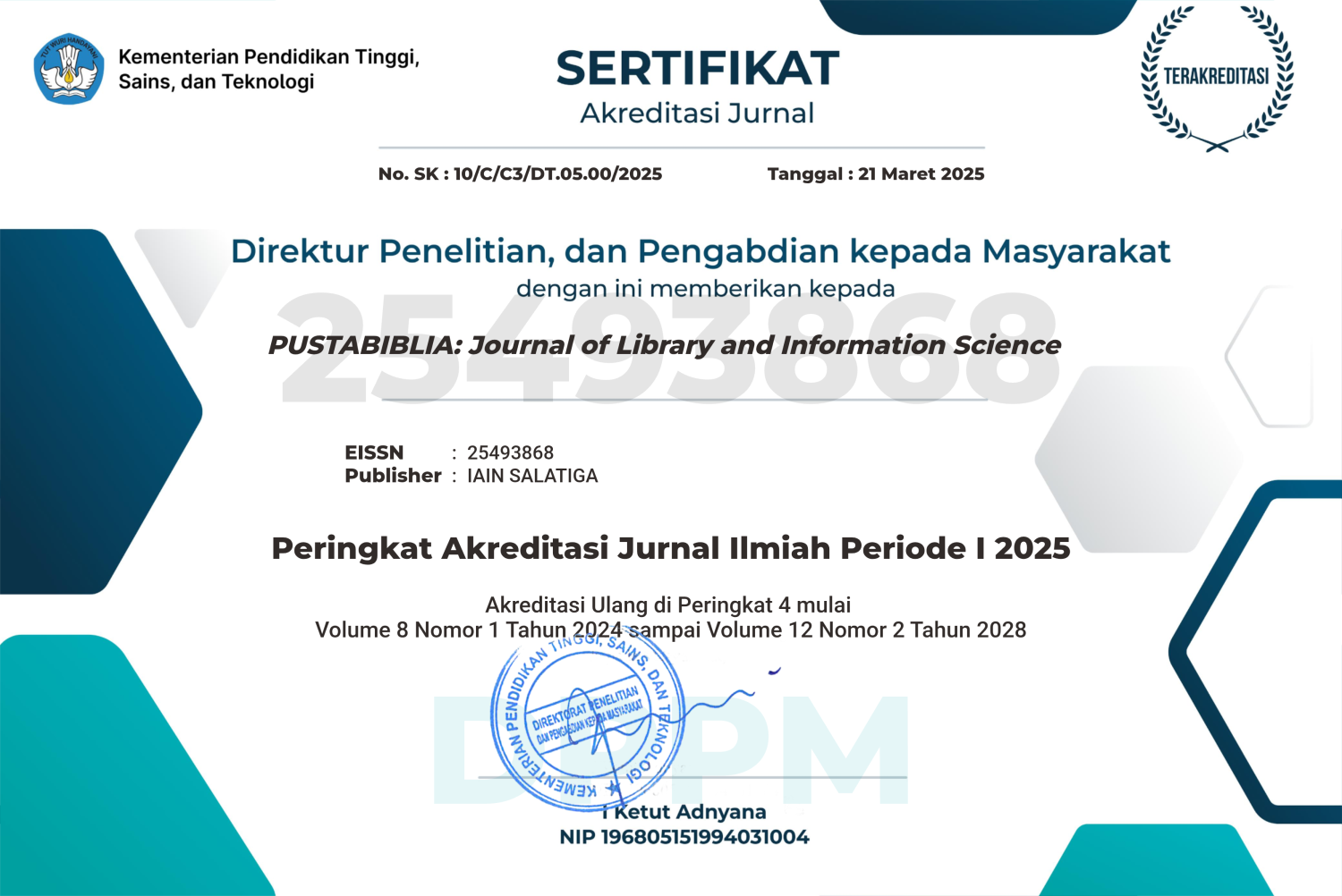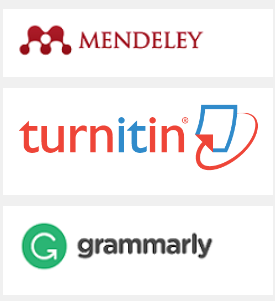Wasathiyah Librarianship sebagai model pengelola informasi dalam menghindari bibliosida: suatu pendekatan konseptual
DOI:
https://doi.org/10.18326/pustabiblia.v9i1.4908Keywords:
bibliocide, information management, Library, librarianship, wasathiyahAbstract
This study explores the concept of wasathiyah librarianship as an Islamic moderation-based model of information management aimed at preventing bibliocide. Employing a descriptive qualitative method through library research, the study draws on primary and secondary sources related to wasathiyah values, librarianship, and bibliocide. The data were analyzed thematically using an interpretive qualitative approach. Findings reveal that implementing the seven pillars of wasathiyah—tawassuth (moderation), i’tidal (justice), tasamuh (tolerance), syura (consultation), islah (reconciliation), qudwah (exemplary behavior), and muwathanah (nationalism)—can foster an inclusive, just, and dialogical librarian paradigm. Librarians who embody these values are positioned to resist censorship, marginalization of information, and monopolization of narratives, thereby supporting a pluralistic and peaceful information ecosystem. The study concludes that wasathiyah librarianship is not only ethically relevant for professional practice but also serves as a strategic approach to safeguarding collective memory against bibliocide. This model should be further developed in Indonesian library policies, especially within religious high educational institutions.
References
ALA. 2024. “Core Values of Librarianship.” https://www.ala.org/advocacy/advocacy/intfreedom/corevalues.
Azis, Abdul, Anam, A. Khoirul, Masykhur, Anis, Fahmi, Muh. Arizal, dan Sopian, Deni. 2021. Moderasi Beragama Berlandaskan Nilai-nilai Islam Buku 1. Direktorat Jenderal Pendidikan Islam Kementerian Agama. Jakarta. //eperpus.kemenag.go.id%2Findex.php%3Fp%3Dshow_detail%26id%3D42512%26keywords%3D.
Diyani, Trini. 2019. “Implementasi Paradigma Islam Wasathiyah; Strategi Menjaga Masa Depan Keindonesiaan.” SALAM: Jurnal Sosial dan Budaya Syar-i 6 (3): 303–16. https://doi.org/10.15408/sjsbs.v6i3.13193.
Donovan, James. 2024. “More than Censorship: The Harm of Libricide.” Libraries: Culture, History, and Society 8 (1): 1–21. https://doi.org/10.5325/libraries.8.1.0001.
IFLA. 2006. “IFLA/UNESCO Multicultural Library Manifesto.” IFLA (International Federation of Library Associations and Institutions). https://www.ifla.org/ifla-unesco-multicultural-library-manifesto/.
Inayatillah, Kamaruddin, dan M. Anzaikhan. 2022. “The History of Moderate Islam in Indonesia and Its Influence on the Content of National Education.” Journal of Al-Tamaddun 17 (2): 213–26. https://doi.org/10.22452/JAT.vol17no2.17.
Iqbal, Muhammad. 2019. “Pelarangan Buku di Indonesia era Orde Baru: Perspektif Panoptikon Michel Foucault.” AGASTYA: JURNAL SEJARAH DAN PEMBELAJARANNYA 9 (1): 56–78. https://doi.org/10.25273/ajsp.v9i1.3591.
Kementerian Agama RI. 2019. Moderasi beragama. Cetakan pertama. Badan Litbang dan Diklat, Kementerian Agama RI.
Knuth, Rebecca. 2003. Libricide: The Regime-Sponsored Destruction of Books and Libraries in the Twentieth Century. Praeger. https://doi.org/10.5040/9798400679308.
Moleong, Lexy J. 2018. Metodologi penelitian kualitatif. Remadja Karya.
Niam, Zainun Wafiqatun. 2019. “Konsep Islam Wasathiyah Sebagai Wujud Islam Rahmatan lil ‘alamin: Peran Nu dan Muhammadiyah dalam Mewujudkan Islam Damai di Indonesia.” Palita: Journal of Social Religion Research 4 (2): 91–106. https://doi.org/10.24256/pal.v4i2.764.
Subaidi. 2020. “Strengthening Character Education in Indonesia: Implementing Values from Moderate Islam and the ‘Pancasila.’” Journal of Social Studies Education Research 11 (2): 120–32.
Yusuf, Iwan Awaluddin, Adiputra, Wisnu Martha, Masduki, Rianto, Puji, dan Zuhri, Saifudin. 2010. Pelarangan buku di Indonesia : sebuah paradoks demokrasi dan kebebasan berekspresi. Disunting oleh Wendratama. PR2Media.
Zed, Mestika. 2008. Metode Penelitian Kepustakaan. Yayasan Pustaka Obor Indonesia.
Downloads
Published
Issue
Section
License
Copyright (c) 2025 Almer Samantha Hidaya

This work is licensed under a Creative Commons Attribution-ShareAlike 4.0 International License.
Copyright
Authors retain copyright and grant the journal right of first publication with the work simultaneously licensed under a Creative Commons Attribution-ShareAlike 4.0 International License. In line with the license, authors are allowed to share and adapt the material. In addition, the material must be given appropriate credit, provided with a link to the license, and indicated if changes were made. If authors remix, transform or build upon the material, authors must distribute their contributions under the same license as the original.
Licensing

This work is licensed under a Creative Commons Attribution-ShareAlike 4.0 International License.







